Golden Boy (Manga)
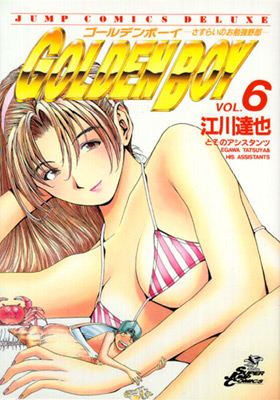
A long time ago, I stumbled upon the Golden Boy OVA series on Nico Nico Douga and thought it was an odd and unique piece of work. It left a bit of an impression but I didn’t think much more of it. Recently, I had the chance to read the 10-volume manga series that it is based on. It blew my mind in a way that words alone fail to describe.
Golden Boy starts off as a sexually-charged gag manga full of raunchy toilet humour much like the OVA, which was made based on six of the chapters contained in the first book. The interesting thing is that, up to the third volume, the degree of sexuality portrayed is actually much more explicit in the OVA than in the manga (at least until the third volume, after which the manga overtakes it by leaps and bounds).
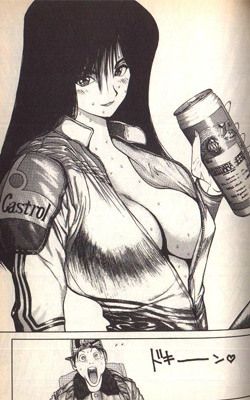
The basic storytelling template is as follows: Kintarou Oe, a boy genius who dropped out of Toudai after obtaining full credits in order to go on a journey of self discovery, arrives at a new town and takes up a new part-time job in order to learn a new skill. There, he meets a hot girl who is usually instantly turned off by his unrestrained perverted nature and thinks that he is just a good-for-nothing freeter. In the end, he surprises everyone by not only picking up the skill in record time, but doing it better than anyone else. He also usually ends up changing the girl’s life positively. But by the time anyone realizes what he has done, he leaves town on his bicycle and heads for his next lesson in life.
This story structure is repeated many times in the first two volumes and appears to be the original concept before the manga. However, by the third volume, things start to change. The episodic storytelling format is eventually replaced by a long continuous story as we learn more about Kintarou.
The most obvious shift happens when he encounters a cult bent on world domination who uses S&M sexual techniques to brainwash and mind control people. This quickly grows into long discussions about the state of modern society and its use of violence as a tool of conflict resolution, the role of the education system in producing unthinking slaves for the system and the role of sex in achieving inner and outer peace.
At this point, I suppose you just went “WTF?”
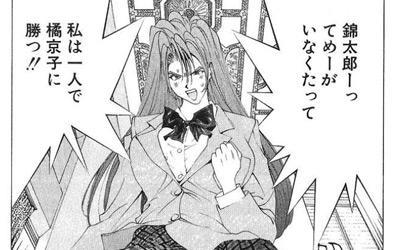
Consider where I cut off the image. Hint: nopan
Yes, the real meat, at least from the author’s perspective, behind Golden Boy is not its expert depiction of the female anatomy or its thorough examination of the different genres of sexual fantasies. It is instead a soapbox for the author to voice his anti-establishment and leftist ideologies in manga form. As a result, Golden Boy’s dialogues can get somewhat wordier than in most other manga, and disagreements between characters frequently descend into discourses on history, politics and society.
The main messages constantly repeated in Golden Boy are:
- The Japanese education system destroys a person’s inert ability to learn and brainwashes him into a conforming slave
- Sex is both a tool of political control and social liberation
- Modern society is built on egoistic violence against other people, against the natural environment, against tradition and culture, against human nature. Examples used include:
- Destroying the environment to build golf courses and a fictional Japan-hosted Olympics (waste of tax money collected forcefully by the government)
- World War II (he brings up Rape of Nanjing and Unit 731), Vietnam War, Russo-Japanese War
- Indoctrination of the people to accept rule by elites through a hierarchical education and corporate system
- The Japanese political system is a continuation of the pre-war status quo and the same old flaws are concealed by material wealth
- Material possession and social status are hollow and meaningless
- Avocation of free love — that true love is not possessive and love does not tie you to your partner
- Avocation of life-long self-motivated learning over systematically-imposed rote learning (i.e. street smart over book smart)
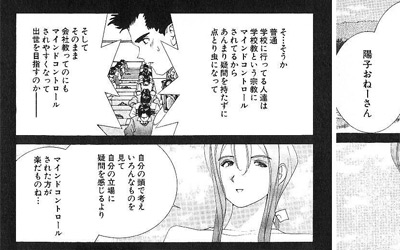
The meaning of life in manga form
It is interesting because a lot of these messages coincide with the leftist and anarchist student movements in post-war Japan. The author, Tatsuya Egawa, was born in 1961 and taught college mathematics for a few months before switching to drawing manga, so it’s easy to see where the political outlook expressed in Golden Boy comes from. He was probably disillusioned by own education experience and subsequently influenced by the leftist anti-government anti-consumerism sentiments that were prevalent in Japanese universities during the height of the Cold War.
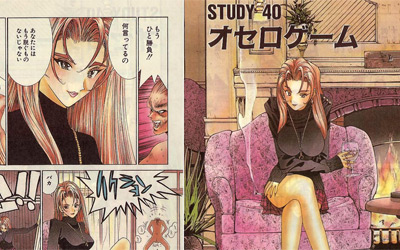
In sooth, Tatsuya Egawa is not at all a good story-teller. He frequently dedicates so much time in writing his tirades against modern society that the story becomes incoherent or neglected. His matter-of-fact rants are also rife with factual errors, probably copied and pasted directly from Communist propaganda pamphlets, so they should be taken with a grain of salt — they are interesting to read but far from gospel. Still, it is very eye-opening to see how Egawa, a Baby Boomer, perceives Japanese society at the end of its roaring bubble economy.
Beyond the political and social messages, Golden Boy also goes into great lengthy discussions about the human psyche — how we derive our own self worth, how we distinguish ourselves from others as individuals, how we seek to dominate or be dominated, etc. The author’s arguments in this areas make for some interesting food for thought, but are probably standard fare for college-level psychology.
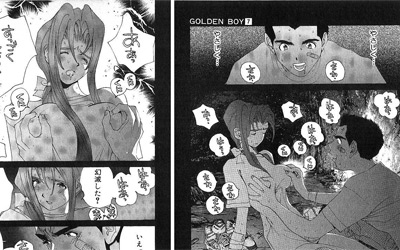
It’s okay because they are (still) wearing clothes
For those who dare to venture into the unknown, be warned. While Golden Boy is not actually considered M-18, this must be placed in context of Japan’s traditionally liberal view regarding sexuality. Let’s just say that it has everything up to the extreme threshold acceptable for a manga that is not explicitly smut, including fetishes, S&M and almost an entire volume dedicated to a single sex scene — the characters literally discuss the socio-political significance and symbolism of sex while doing it.
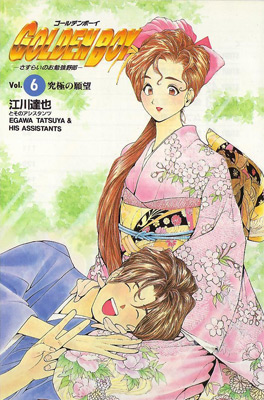
Golden Boy is really one of those only-in-Japan phenomenons that can never find a profitable niche outside of Japan, except perhaps in prose form. Beyond the first two volume and the OVA series, the series’ message is so foreign, explicit and politically-charged that it’s impossible to appreciate it outside of its intended context.
With the right mindset and conditions, one can find some meaningful ideas in the way Golden Boy pushes the envelopes of political correctness and sexuality. But that perfect cosmic alignment of the universe happens rarely, so it’s not something I can recommend to anyone even though I found it curiously enjoyable. It’s an odd piece of work that is difficult to appreciate, as evidenced by the slew of hate-filled negative reviews it receives online. Really a hit-or-miss thing.
If you are still interested, you can find scanslations (no idea how good they are since I read the raws) up to the start of Volume 8 on AnimeA and raws of all ten volumes on Crazy’s Manga.
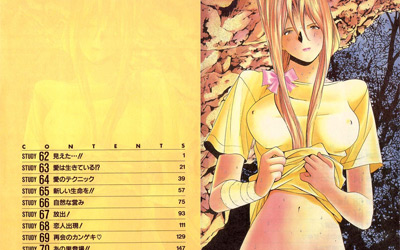
It’s also quite amazing to hear that Tatsuya Egawa has apparently just recently started to serialize Golden Boy II in Business Jump, after ending the original run abruptly thirteen years ago. (Sadly, the ANN comment thread on this announcement is quite superficially negative because English speakers’ exposure to the series is limited to the OVA series.)
I haven’t had a chance to read the first chapter of Golden Boy II yet, which I believe has already been published, but the promotion art looks quite evolved from his earlier works. I just wonder if the passage of time has served to temper Egawa’s fiery brand of political expression and if Golden Boy 2 will turn out to be a more mainstream ecchi gag comedy. Looking forward to finding out.
P.S. Having recently discovered the joy of RawScans, I have been downloading and consuming manga raws ravenously. I just finished reading Tokyo University Story, a 34-volume series by Tatsuya Egawa that was serialized the same time as Golden Boy. It contains the same general themes, but with a lot more focus on education and human relationship. It also has the most WTF ending ever in the history of human creativity.
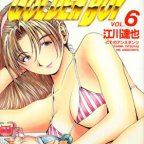




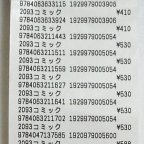

September 30th, 2010 at 11:38 pm
Too NSFW to read at home. However Kintarou’s character is somewhat endearing in a weird way XD
October 13th, 2010 at 8:59 pm
Since you read the Raws, do you know what happens in the end? I tried to read the raw but I don’t understand a lick of Japanese. If at all possible could you post a little summary or email me one? I’d very much appreciate it, I’ve been looking all over for an explanation to what happened.